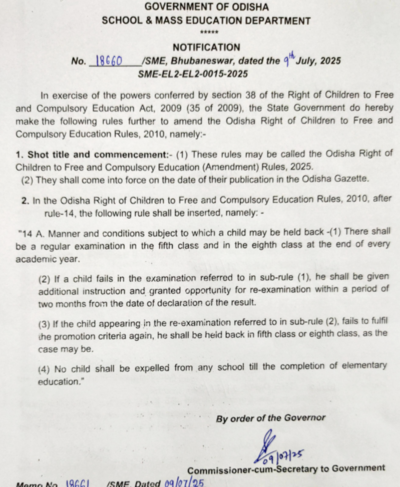
The Odisha government has announced the implementation of a fail-and-retention policy for students in Classes 5 and 8, marking a significant change in the state's approach to school-level assessments.
The move will be effective from the current academic session, according to the official notification issued by the School and Mass Education Department.To give effect to the new policy, the state government has amended the Odisha Right of Children to Free and Compulsory Education Rules, 2010. Under the revised framework, annual examinations will now be conducted at the end of each academic year for students enrolled in Class 5 and Class 8 across government and aided schools.Students who do not meet the required standards in these examinations will not be promoted automatically. Instead, they will receive remedial instruction and be given a second opportunity to appear for a re-examination within two months of the result announcement. The notification further specifies that if a student fails to qualify in the re-test as well, they will be retained in the same class for the next academic year.
“If the child appearing in the re-examination, fails to fulfil the promotion criteria again, he/she shall be held back in fifth class or eighth class, as the case may be,” the notification stated, reports PTI.However, the government has clarified that the new rule does not allow for expulsion. No student will be removed from the school system until the completion of elementary education, in line with provisions under the Right to Education (RTE) Act.
Policy background
The policy shift comes after the central government, in December last year, amended the Right of Children to Free and Compulsory Education Act, 2010. The amendment gives individual states the authority to reintroduce assessments and retention in Classes 5 and 8, with safeguards such as remedial teaching and re-examinations in place. This development follows earlier amendments made in 2019, aimed at increasing learning accountability across schools.
What the policy change means for students
For students, the new fail system introduces a formal assessment structure after years of automatic promotion. While the government maintains that the policy is designed to improve academic outcomes, it also places greater emphasis on performance at key transitional stages in elementary schooling.The introduction of re-examinations and targeted instructional support is intended to help struggling students bridge learning gaps.
However, students now face the added pressure of meeting promotion criteria, particularly in environments where access to quality teaching and remedial support varies widely.Education officials have indicated that further guidelines will be issued to schools regarding the nature of remedial instruction and the format of assessments. Implementation of this policy will require coordination at multiple levels to ensure that students receive the academic support needed to succeed in both the primary and upper primary stages.The move reflects an effort to strike a balance between inclusive education and the need to uphold academic standards at the foundational level.
TOI Education is on WhatsApp now. Follow us here.

 9 hours ago
46
9 hours ago
46




























 English (US)
English (US)